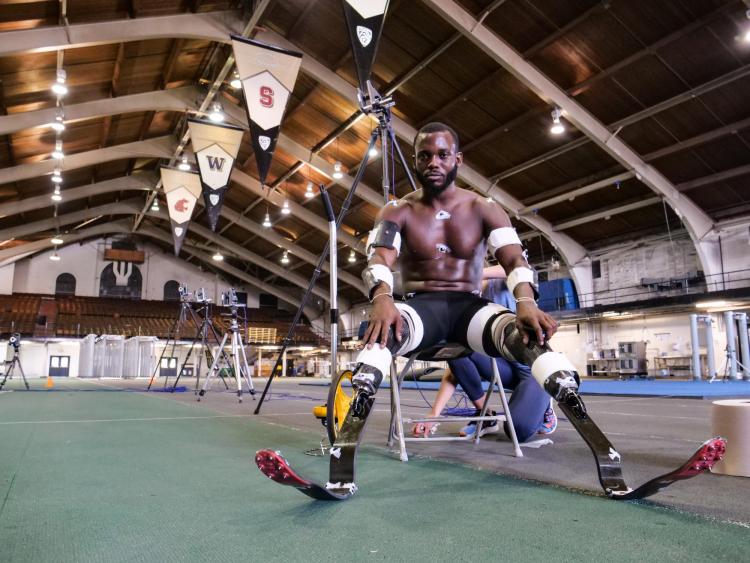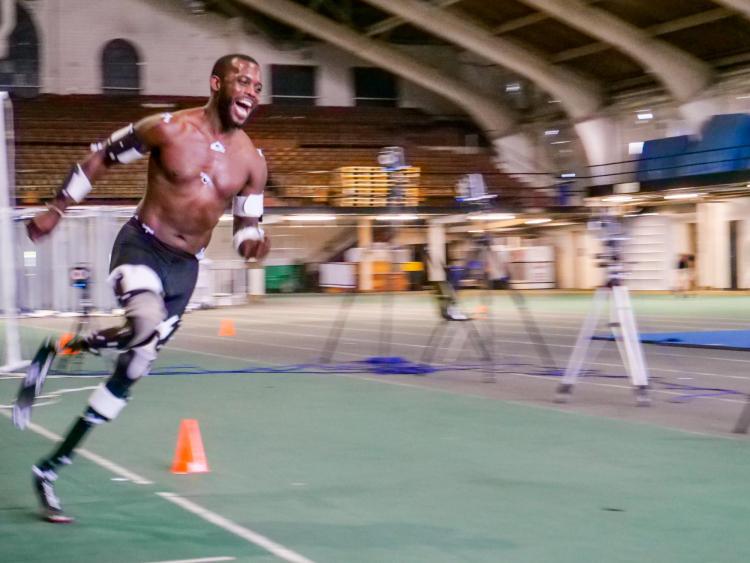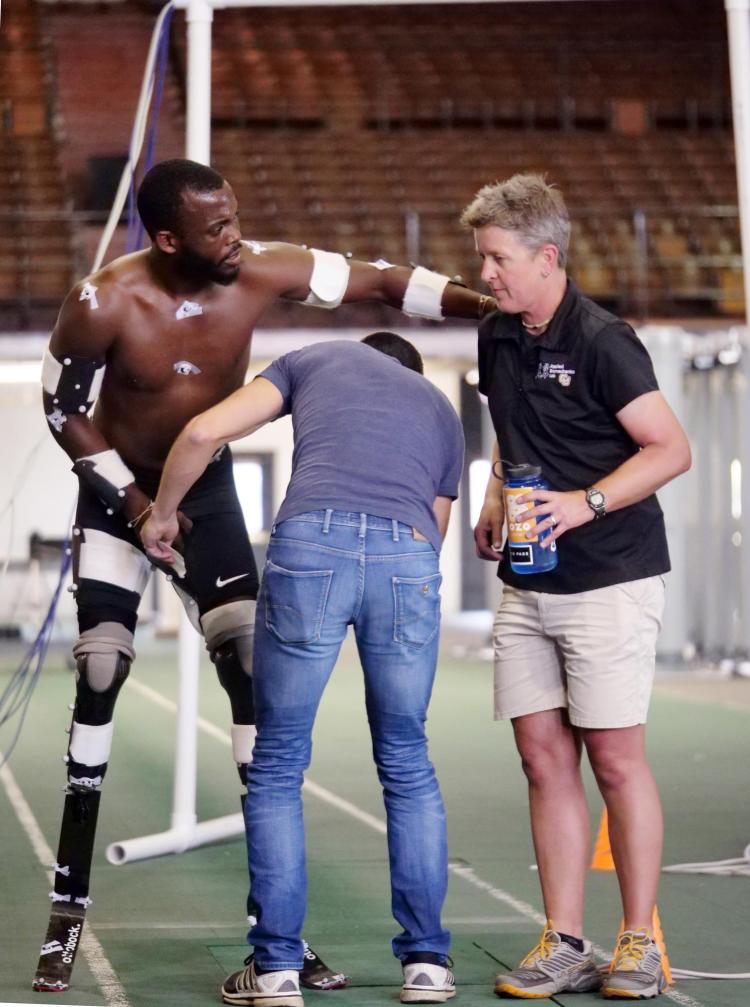Court ruling barring ‘blade runner’ from Olympics is scientifically unfounded, studies suggest

IMAGE CAPTION: Blake Leeper, who was born without legs, takes a break from testing at CU Boulder in 2018. This week, an international court ruled he cannot compete in the Tokyo Olympics because his prostheses make him too tall. CU Boulder researchers say the ruling is unfounded. Credit: Glenn Asakawa
This week’s international court ruling barring a Black double-amputee sprinter from the Olympics overlooks evidence that his prostheses provide no competitive advantage and instead hinges on racially biased data, according to CU Boulder researchers at the center of the debate.
“Our studies found that Blake Leeper’s prostheses do not provide him with a competitive advantage compared to nonamputees, and there is no data to suggest that his height allows him to run faster,” said Alena Grabowski, an associate professor of integrative physiology who specializes in the study of running prostheses.
Grabowski added that the court’s surprising decision, published in full Wednesday, was informed by studies including only white and Asian athletes.
“We believe this is a discriminatory and unorthodox ruling,” Grabowski said.
The new ‘blade runner’
In August 2018, Leeper, an elite sprinter from Kingsport, Tennessee, visited Grabowski’s Applied Biomechanics Lab for a series of tests aimed at answering one key question: Does a double-amputee running on carbon fiber blades have an advantage or disadvantage over sprinters with biological legs?
That summer, Leeper had sprinted the 400-meter in 44.42 seconds, breaking the record of famed "blade runner" Oscar Pistorius, who in 2012 became the first below-the-knee amputee to compete against able-bodied runners at the Olympic games.

Olympic hopeful Blake Leeper sprints around the track at Balch Fieldhouse in 2018.

Blake Leeper, left and Alena Grabowski, right at Balch Fieldhouse in 2018.
“For kids who had an amputation and for adults who had some sort of physical disability – to be able to see Pistorius push the boundaries like that, it really opened a door,” said Grabowski, whose research determined Pistorius did not have a competitive advantage—as some had alleged—and helped gain him entry to the Olympic games.
After Pistorius’ history-making run, the International Association of Athletics Federations (now known as World Athletics) ruled that, going forward, athletes using such "mechanical aids" must take it upon themselves to prove their blades do not give them a competitive edge.
With his eye on the Olympics and his times putting him within reach, Leeper—who was born without legs—enlisted Grabowski’s help.
He flew to Boulder for a series of grueling experiments, assessing his physiology and biomechanics while bursting out of the starting blocks, running at maximum speed, handling curves and sprinting to exhaustion.
The research team then compared his performance, physiology and biomechanics to those of more than 30 nonamputee elite runners and submitted the results to the world's top sports court, the Court of Arbitration for Sport in Lausanne, Switzerland.
Their findings, summarized in the CAS’s 110-page decision Wednesday, concluded that, compared to nonamputees: Leeper does not accelerate faster at the start, achieve faster maximum sprint velocities, run around a curve as fast, run faster at maximum aerobic capacity or exhibit superior sprinting endurance. In fact, Grabowski noted, his prostheses render him at a significant disadvantage bursting out of the blocks and rounding curves.
“We performed more tests, collected more data and made more comparisons than those performed for Oscar Pistorius, and our testing methods and results were reviewed and approved by the same eminent scientists,” Grabowski wrote. “If this rigorous scientific evidence is not found to be sufficient …then we are unable to envision that any person with an amputation will ever be permitted to compete against non-amputee athletes in elite running competitions.”
On Monday, the court announced it had partially ruled in Leeper’s favor, determining that the rule requiring athletes to bear the burden of proof that they do not have an unfair advantage is “unlawful and invalid.” Going forward, that burden will rest on World Athletics.
“That’s good news,” said Grabowski, who provided the testing for Leeper at no cost. “For an athlete to have to take this on themselves is an immense and expensive task.”
But in the same ruling, the court determined that Leeper himself could not compete in any World Athletics-sanctioned events, including the Olympics, because his prostheses enable him to run at a height that is “several inches taller than his maximum possible height if he had intact biological legs.”
Grabowski’s team was stunned.
“We presented a lot of measurements and data to support the fact that running prostheses do not provide an unfair advantage, and the main points of our scientific report were accepted by the Court of Arbitration for Sport. So it was really surprising to see that, on the other hand, they accepted the idea that ‘tall prostheses’ provide an advantage, with no data,” said Paolo Taboga, an assistant professor of kinesiology at California State University who worked on the Leeper study in Grabowski’s lab.
What the science says
The researchers contest the ruling on two grounds.
First, in a study published in the journal PLOS ONE in February, they found that height makes no difference when it comes to maximum sprinting speed.“We find that while you do take longer steps, you also cycle your legs slower so in the end, the two even out,” said Taboga.
Second, Grabowski noted, the Paralympic Committee’s Maximum Allowable Standing Height (MASH) rule, upon which the court based its decision, stems from just two studies that included no Black study subjects.
“These studies, designed to determine how tall a person would be with biological legs, are based on a subset of the population and do not include people of African descent whose proportions are very likely different,” said Grabowski.
In order to compete in the Tokyo games under the rule, Leeper would have to modify his prostheses to make him approximately 6 inches shorter.
“You can only imagine how difficult that would be for a runner,” said Grabowski.
Grabowski said she intends to publish the full results of her study with Leeper in a peer-reviewed journal later this year.
Leeper, now 31, and his legal team plan to fight the decision in civil court.
“I will never give up and will continue to do all I can to compete and be judged by standards that are nondiscriminatory in every way,” said Leeper.


